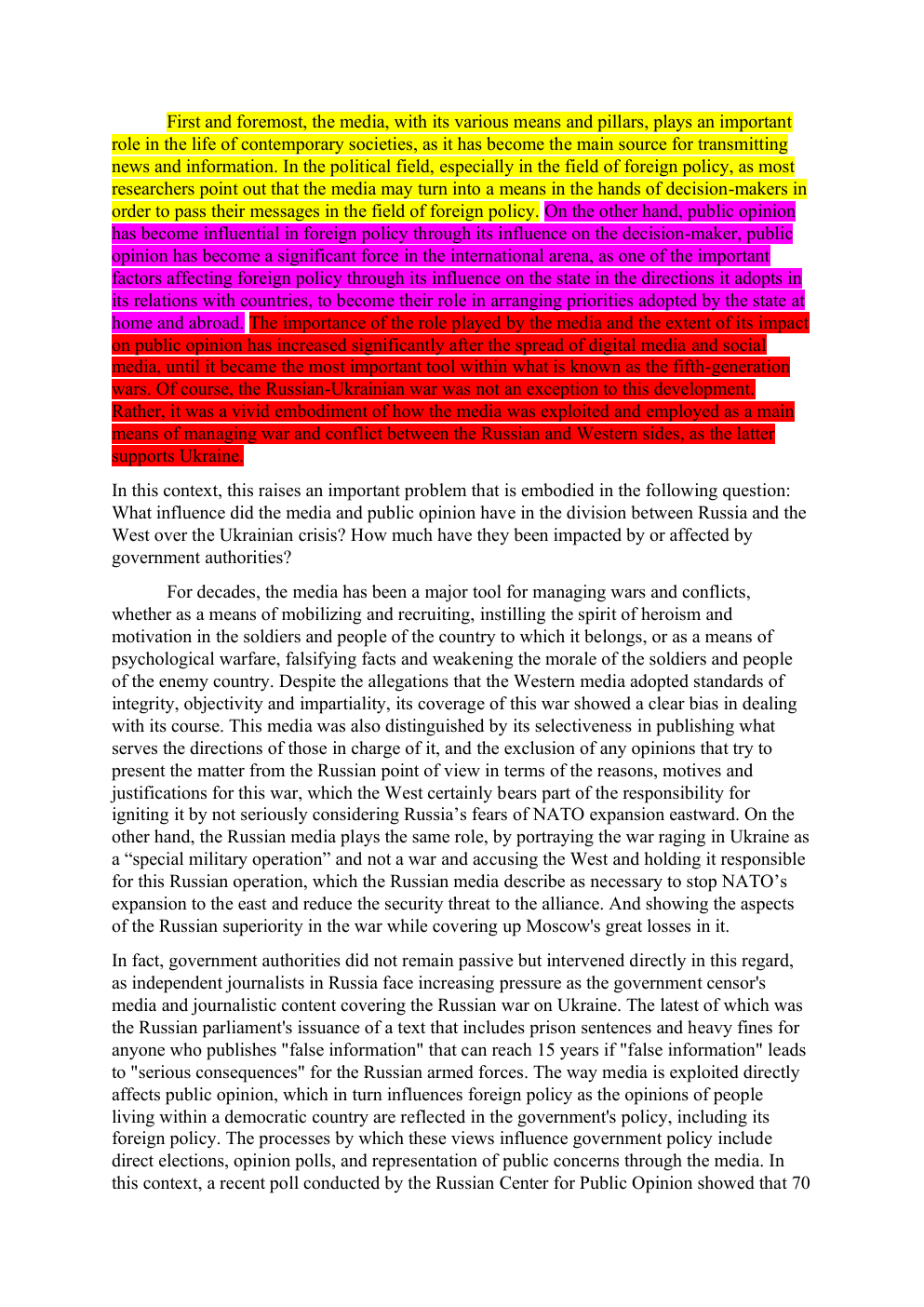Ukrainian Crisis
Publié le 20/04/2022

Extrait du document
«
First and foremost, the media, with its various means and pillars, plays an important
role in the life of contemporary societies, as it has become the main source for transmitting
news and information.
In the political field, especially in the field of foreign policy, as most
researchers point out that the media may turn into a means in the hands of decision-makers in
order to pass their messages in the field of foreign policy.
On the other hand, public opinion
has become influential in foreign policy through its influence on the decision-maker, public
opinion has become a significant force in the international arena, as one of the important
factors affecting foreign policy through its influence on the state in the directions it adopts in
its relations with countries, to become their role in arranging priorities adopted by the state at
home and abroad.
The importance of the role played by the media and the extent of its impact
on public opinion has increased significantly after the spread of digital media and social
media, until it became the most important tool within what is known as the fifth-generation
wars.
Of course, the Russian-Ukrainian war was not an exception to this development.
Rather, it was a vivid embodiment of how the media was exploited and employed as a main
means of managing war and conflict between the Russian and Western sides, as the latter
supports Ukraine.
In this context, this raises an important problem that is embodied in the following question:
What influence did the media and public opinion have in the division between Russia and the
West over the Ukrainian crisis? How much have they been impacted by or affected by
government authorities?
For decades, the media has been a major tool for managing wars and conflicts,
whether as a means of mobilizing and recruiting, instilling the spirit of heroism and
motivation in the soldiers and people of the country to which it belongs, or as a means of
psychological warfare, falsifying facts and weakening the morale of the soldiers and people
of the enemy country.
Despite the allegations that the Western media adopted standards of
integrity, objectivity and impartiality, its coverage of this war showed a clear bias in dealing
with its course.
This media was also distinguished by its selectiveness in publishing what
serves the directions of those in charge of it, and the exclusion of any opinions that try to
present the matter from the Russian point of view in terms of the reasons, motives and
justifications for this war, which the West certainly bears part of the responsibility for
igniting it by not seriously considering Russia’s fears of NATO expansion eastward.
On the
other hand, the Russian media plays the same role, by portraying the war raging in Ukraine as
a “special military operation” and not a war and accusing the West and holding it responsible
for this Russian operation, which the Russian media describe as necessary to stop NATO’s
expansion to the east and reduce the security threat to the alliance.
And showing the aspects
of the Russian superiority in the war while covering up Moscow's great losses in it.
In fact, government authorities did not remain passive but intervened directly in this regard,
as independent journalists in Russia face increasing pressure as the government censor's
media and journalistic content covering the Russian war on Ukraine.
The latest of which was
the Russian parliament's issuance of a text that includes prison sentences and heavy fines for
anyone who publishes "false information" that can reach 15 years if "false information" leads
to "serious consequences" for the Russian armed forces.
The way media is exploited directly
affects public opinion, which in turn influences foreign policy as the opinions of people
living within a democratic country are reflected in the government's policy, including its
foreign policy.
The processes by which these views influence government policy include
direct elections, opinion polls, and representation of public concerns through the media.
In
this context, a recent poll conducted by the Russian Center for Public Opinion showed that 70.
»
↓↓↓ APERÇU DU DOCUMENT ↓↓↓


